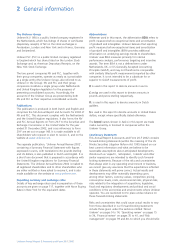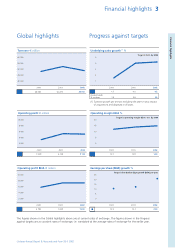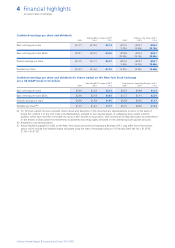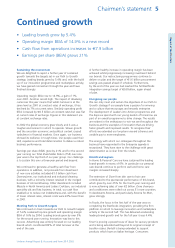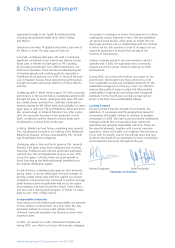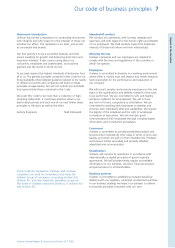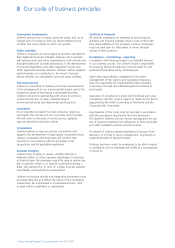Unilever 2002 Annual Report Download - page 15
Download and view the complete annual report
Please find page 15 of the 2002 Unilever annual report below. You can navigate through the pages in the report by either clicking on the pages listed below, or by using the keyword search tool below to find specific information within the annual report.
Unilever Annual Report & Accounts and Form 20-F 2002
12 About Unilever
We reduced the impact of many of our key performance
indicators, such as energy and water use. However, we did
not meet all of the stretching targets that we set ourselves.
For the fourth year running we have led our sector in the
Dow Jones Sustainability Indexes. We also won the best
overall Environmental Reporting Award, in the Association
of Chartered Certified Accountants (ACCA) UK Awards for
Sustainable Reporting.
Responsible corporate behaviour
Corporate social responsibility is integral to the way we run
our business and has been part of our operating tradition
from our earliest days. Our corporate purpose and Code of
Business Principles commit us to the highest standards of
corporate behaviour as we seek to meet the everyday needs
of people everywhere.
The Code of Business Principles sets a framework for
operational standards of behaviour, such as ensuring the
safety of products or reducing the environmental impact of
our manufacturing operations. Following revision in 2001,
the Code was rolled out around our business in 2002 to
help all our employees understand its implications. The roll-
out included global and regional workshops, supported by
an intranet site and an online learning tool. The Code has
been translated into more than 35 languages.
Our director for corporate development leads our work
on corporate social responsibility. Over recent years this
programme has focused on increasing our understanding
and explaining the impact of our business on society.
We regard the very business of doing business in a
responsible and sustainable way as the core of our
corporate social responsibility: selling products that
meet local consumers’ needs, investing in productive
capacity, spreading our technical know-how, working
in partnerships through the value chain and in local
communities, and making environmental responsibility
acentral business practice.
In late 2002 we published a second Social Review (available
online at www.unilever.com/environmentsociety). The
Review explores what it means for us to be a responsible
corporate citizen. It gives an insight into the day-to-day
practice of our business around the world and our
relationships with consumers, customers and those who
work in our companies, as well as with our wider
community of stakeholders.
In 2002, our companies spent approximately 69 million
on community projects. These ranged from commercial
marketing initiatives that contributed to communities such
as Signal toothpaste’s dental care programme in Saudi
Arabia and Bushells tea road safety campaign in Australia,
to social investments such as our uniquely ME! self-esteem
programme for underpriviledged children run with the Girl
Scouts in the USA.
Often it is in our direct involvement, in the sharing of our
skills and expertise, that we can make the most difference.
For example, in China, Mexico and South Africa, Unilever
actively participates in local schools, not only through
donations but also through employees giving their time to
teach and to renovate buildings. At the end of 2001, our
company in Brazil handed over to the local community a
redundant ice cream factory it had helped to renovate. The
factory is now used as a technical school for 21 000 low-
income students on courses as diverse as computing, hotel
management and tourism.
Our brands are active too. Building on its long-standing
promotion of heart health in Canada, Becel supported
Stroke Month and World Heart Day by donating 25 cents
from each Becel spread or oil sold in several provinces.
This raised Canadian $200 000 (136 000) for heart health
research and hospital programmes. In Europe and Chile our
Domestos brand has been working in a five-year alliance
with the Red Cross movement to promote initiatives on
health and hygiene, a relationship now evolving to include
other Home & Personal Care brands. It is by focusing on the
areas in which we have particular business expertise that we
can make the most effective contribution to society.
Competition
We have a wide and diverse set of competitors in our
consumer goods businesses. Many of our competitors
also operate on an international scale, but others have
anarrower regional or local focus.
Competition is intense and challenging. We aim to
compete and give value to our consumers and customers
in three ways:
•by continually developing new and improved products;
•by sharing our innovations and concepts with our
businesses all around the world;
•by striving to lower the cost of our sourcing,
manufacturing and distribution processes whilst still
maintaining, and improving, the quality of our products.
We support efforts to create a more open competitive
environment through the liberalisation of international
trade. We also support the fuller implementation of the
Single European Market and inclusion of other European
countries in the European Union.
Exports
We sell our products in nearly all countries throughout
the world and manufacture in many of them. Inside the
European Union we make many of our products in only
afew member countries, for sale in all of them.
We also export a wide range of products to countries
where we do not make them. We often use this export
trade to develop new markets, usually through our facilities
in neighbouring countries, before building local
manufacturing facilities.


